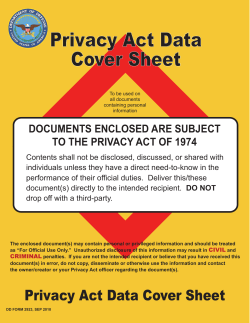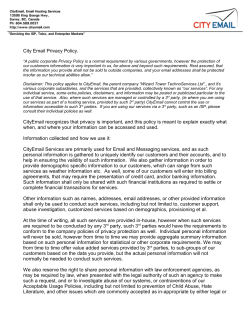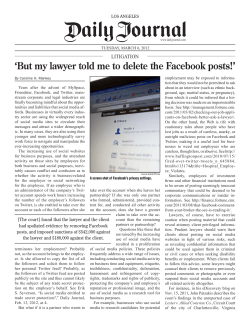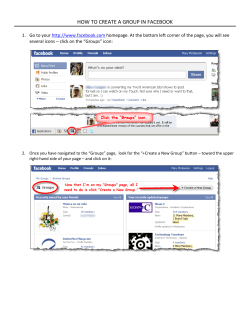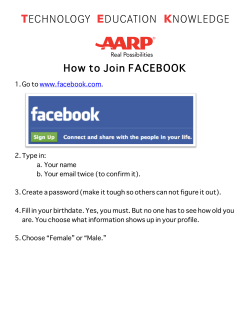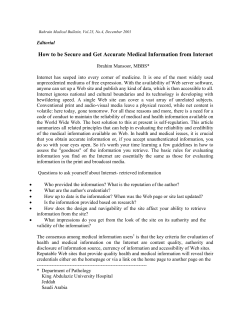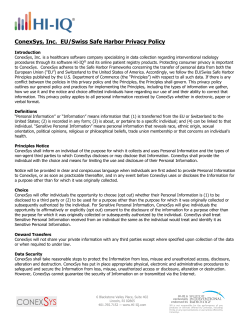
A review of uncharted legal waters —
A review of uncharted legal waters — How to navigate uncertainty on the social Web Introduction: “It Depends” There IS NO “law of social media,” yet! Law evolves slowly and cannot maintain pace with technological change Much is likely adaption of legacy rules Applying traditional common law and statutory principles to new media Unique aspects of social networking, e.g., one-to-many public communications, eventually reflected in specific decisions Progress in fits and starts, formed principally by litigation, e.g., LaRossa v. Twitter (2009), AFP v. Morel (2010) State or federal legislation virtually impossible and hardly comprehensive Overview “Old wine in new bottles” Social media & intellectual property Social media & employment Social media & privacy Corporate/regulatory compliance Managing enterprise legal risks Potential regulation Old Wine In New Bottles “Are users liable for their posts and tweets?” Privacy and tort Defamation, invasion of privacy, false light, e.g., Courtney Love, Kim Kardashian NDA, non-competes, trade secret and proprietary/confidential content Lanham Act (trademark infringement, dilution, etc.) SEC Reg. FD & “quiet period” restrictions Others: cyber bullying, prostitution, child pornography, etc. 19 Facebook posts that led to arrests See recent Mass. law (5/2010) requiring public school officials to enforce anti-bullying rules also on email/social networks Social Media and IP Major issue is who owns user-generated content (UGC)? Possession ≠ 90% of law Different conclusions for TM, © and patents No present consensus on what is protected, what is public domain and what is in between, e.g., Facebook 2009 “ToS” crisis Nature of expression AND nature of posting are both key factors Implied license for (some) “public” postings, depending on content, ToS and author/generator claim? Status updates v. photos, for instance Location info. Social Media and IP (con’t) Are posts copyrighted? Original expression v. opinion v. fact Compare, e.g., “Three-peat”TM ToS cannot create legal rights That Facebook ToS does not claim copyright is not dispositive ToS avoid thorny issues whether license grant extends to deceased users and how to harmonize conflicting claims to social stream Public domain (implied license) IF unprotected...? UK Press Complaint Commission says publishing socially-posted “epic boobs” photos permissible <http://www.pcc.org.uk/cases/adjudicated.html?article=NjM5OA> U.S. district court says Agence Presse France had no license to republish publicly available TwitPic photos <http://www.scribd.com/doc/46000149/Agence-France-Presse-v-Morel-10-Civ2730-WHP-S-D-N-Y-Dec-23-2010> Posts, fair use (CNN?) and “retweeting” TMs, Genericide & “Twittersquatting” Aspirin on the real-time Web Massive volume of UGC presents increased compliance burdens. Vexing customer relations issues from infringing brand “fans.” User name infringement/dilution Anti-Cybersquatting Act and DMCA notice-and-takedown procedures likely inapplicable to social media. Personal names (unlike brands) have not usually achieved protected “secondary meaning.” Parody and “gripe” usage probably not “in commerce” Deep pocket reality puts social networks in $$ center of disputes, with common law theories (conversion, negligence, defamation) akin to early domain name struggles Social Media & Employment Employers may use social media UGC for hiring/firing decisions Corporate “social media policy” can prohibit employee participation (e.g., DoD, WSJ, NFL players), marks/logos, use of company IT, etc. Evolving common law right to workplace email privacy (e.g., New Jersey) may extend to some UGC Statutes (CFAA) protect non-consensual intrusion into third-party employee socmedia accounts Can employer meet out employee discipline for third-party comments (NLRB)? <http://www.wired.comthreatlevel/2009/06/facebookfollow/> Facebook as the “the new water cooler” Marketing/PR positions present different rights & risks Socmedia participation is employment BFOQ Scope of discretion and PR performance objectives may conflict with legal control given rapidity of socmedia news/response cycles Social Media & Privacy No general privacy law, but sector-specific legislation (healthcare/HIPAA, financial services/GLB, etc.) on infosec & privacy applies to social media Sen. Kerry privacy bill (S.799); Reps. Boucher-Stearns draft “discussion” privacy bill (2010) FTC and EU complaints against Facebook raise possibility of adjudicatory “rules” development FTC “do not track” proposal gaining traction (S.913/H.R.954) CAN-SPAM likely inapplicable beyond “commercial email” (but see SMS/texts under TCPA) Does “business relationship” safe harbor allow mobile wireless delivery? Growing LBS technologies present new/different privacy issues <http://blog.cdt.org/2009/06/19/the-dawn-of-the-location-enabled-web/> EC declares Data Protection Directive applies to social networks Corp./Reg. Compliance Regulated industries — pharmaceuticals, health care, financial servs. — face challenge of reg. compliance in “social stream,” especially re mandatory disclaimers Consumer advocates petition FDA to disallow pharmaceutical use of social media posts (5/2010) FDA fines Novartis for socmedia marketing; sharing widgets & metadata (8/2010) Official FDA guidance delayed > 6 mos. (6/2011) but proposed regulation of “mobile medical apps” (7/2011) SEC Reg. FD always applicable to employee posts, not “individual capacity” Public companies may rely on blogs for Reg. FD compliance (7/2008) FINRA Regulatory Notice 10-06 (1/2010) SEC 21st Century Disclosure Initiative delayed > 2 years SEC sanctions brokers for Facebook “private placements” <http://www.ft.com/intl/cms/s/2/4ff89ac8-9235-11e0-9e0000144feab49a.html#axzz1T929yG00> Socmedia can create HR (EEOC, Title VII), debt collection, consumer rights exposure, e.g., posting text, “friend/follower” selection, etc. Managing Legal Risks Proactive or defensive use of socmedia? Crisis and litigation management, e.g., Taco Bell tainted beef class action <http://mashable.com/2011/02/17/taco-bell-social-mediadefense/> Reputation and brand protection, e.g., Mendenhall v. Hanesbrands <http://www.cbsnews.com/8301-31751_162-20080715-10391697.html> Clear “social media policy” (SMP) for enterprise, different from email and IT system privileges Manage employees’ reasonable privacy expectations Practices as relevant as formal policy Protect IP assets against dilution and genericide Product marketing, reputation mgmt. and hiring present major areas of risk Disclosure Nondiscrimination Position-specific guidelines and “hotline” Managing Legal Risks (con’t) “Best Practices” — http://sncr.org/wp- content/uploads/2008/09/sncr-social-media-policy-best-practices.pdf Culture—Foster corporate culture of openness. Listen to & respect opinions of employees, customers and other stakeholders. Trust—Employees should be trusted to communicate and develop relationships with customers. Do not review content prior to posting. Training—Provide employee training about how to blog; review legal issues with employees. Give employees option of participation for offhours socmedia activities. Transparency—Disclose connections with customers. Reveal commercial and sponsored relationships. Transparency and authenticity are key. Accuracy—Confirm facts. Check with colleagues before publishing content that will affect them. If employees write about private matters, insist upon permission before postings. Comments—Develop and clearly communicate SMP. Set expectations by clearly communicating what is (and what is not) allowed on enterprise blogs/posts. Permit both negative and positive comments, but restrict inappropriate comments. Potential Regulation Sponsored posts and “pay-per-tweet” face FTC, state consumer protection, Lanham Act and tort exposure. Disclosure is best practice whether or not yet mandatory. Facebook advertising, contextual networks and mobile advertising present varying regulatory risks, esp. privacy/optin. States developing laws specific to social media, e.g., North Carolina re sex offender access, New Jersey A-3757 re harassment/abuse, Calif. AB-632 re social photostream copy protection. Potential for federal preemption IF national standard established. Never underestimate ability of legislators to pass silly laws, e.g., prohibiting “silent” cell phone cameras <http://www.pcworld.com/article/158444/congress_and_camera_phones_arent_ clicking.html> Take-Aways Little social media-specific judicial precedents & essentially no legislation. Don’t expect short-term statutory resolution. Legacy real-world rules apply, sometimes as adapted, to social stream. Otherwise unlawful practices are still illegal when online. Typical privacy rules (sector-specific) for social media, including EU Directive UGC ownership is significant IP and corporate/HR issue Special compliance concerns for regulated industries and Reg FD financial/sales releases. Pharma, banking, etc., need special SMPs. Cauldron of litigation likely to yield confusing & conflicting precedents, more certainty for socmedia sites than GCs and PR profs. Nothing protects you against stupidity! Contact http://law.manishin.com http://facebook.com/gmanishin http://duanemorris.com/gbmanishin.html
© Copyright 2025

